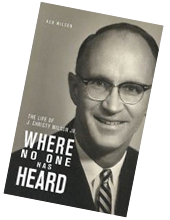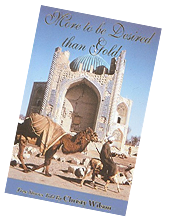Back to series
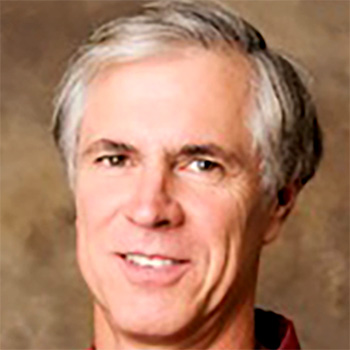

Recommended Reading:
Recommended Reading:

Life of J. Christy Wilson Jr. (1921-1999) and His Worldwide Discipling Ministry
Click here to open a Print - Friendly PDF
Christy Wilson’s first contact with making disciples came even before his first words, his first steps, or his first friendships. His childhood home in Persia (now known as Iran) was a perpetual showcase displaying God’s heart for disciple making. His parents served as missionaries in Tabriz for two decades, and Christy’s heart for God and for making disciples quickly grew.
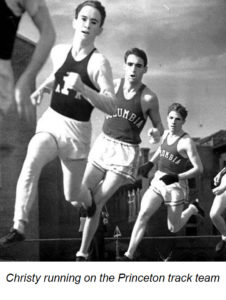 When Christy was just five years old, Pastor Stefan Huviar, a beloved Nestorian evangelical pastor who labored alongside Christy’s father in Tabriz, asked Christy what he wanted to do when he grew up. Christy had frequently heard his parents praying for Afghanistan, an unreached country to the east. He knew that this country, approximately the size of Texas, didn’t have even one Christian.
When Christy was just five years old, Pastor Stefan Huviar, a beloved Nestorian evangelical pastor who labored alongside Christy’s father in Tabriz, asked Christy what he wanted to do when he grew up. Christy had frequently heard his parents praying for Afghanistan, an unreached country to the east. He knew that this country, approximately the size of Texas, didn’t have even one Christian.
“I want to be a missionary to Afghanistan,” Christy informed Pastor Huviar.
“Well,” the pastor responded, “missionaries aren’t allowed in Afghanistan.”
“That’s why I want to be one there,” Christy immediately replied.
And that is exactly what Christy did for more than two decades.
Billy Graham once noted, “J. Christy Wilson will go down in history as one of the great and courageous missionaries for the gospel in the twentieth century.” Among many other things, he helped launch what became the triennial Urbana missions conference; pioneered Christian work in Afghanistan when others thought it impossible, entering the country as one of a few Christians in a nation of approximately 12 million Muslims; taught private English lessons to the crown prince of Afghanistan; founded a mission that remains fruitful to this day; reintroduced the biblical idea of leveraging one’s profession for the kingdom of God with the term tent making; and faced danger on numerous occasions.
Princeton Years
When Christy was fourteen, his mother and three siblings returned to the United States while his father remained in Persia for three more years. Christy enrolled at Lawrenceville School in New Jersey, graduating as valedictorian in 1940. He then studied at Princeton University, where he was captain of the varsity track team, and then graduated from Princeton Theological Seminary.
During Christy’s first weeks at Princeton, a classmate invited him to a prayer meeting of the Princeton Evangelical Fellowship (PEF), held in a dormitory room. Donald Fullerton, an alumnus from the class of 1912, taught the PEF Bible class on Sunday afternoons and invested greatly in Christy’s life. The men in PEF recruited Christy to help distribute copies of the Gospel of John to the entire freshman class. Christy was embarrassed at first, since the recipients were his own classmates. However, he would later be grateful that he had persisted in the work. Twenty-six of his classmates were to die in World War II.
Also during his freshman year at Princeton, he was introduced to InterVarsity Christian Fellowship (IVCF). Stacey Woods, the first secretary-general of InterVarsity/USA, went to great lengths to share his vision for student evangelism with Christy, recognizing his Christian maturity and potential.
Launching the First Urbana Missions Conference
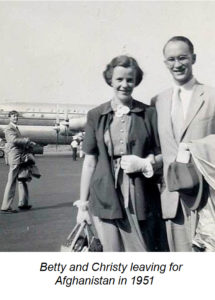 An influential IVCF board member had been urging Stacey to find someone from an Ivy League college to serve on staff. In September 1943, Christy became that person. He initially joined as a part-time staffer, working with InterVarsity on weekends while still a student at Princeton. During his initial years, he was responsible for visiting college campuses throughout New York and New England. His task was simply to pass along his passion for missions to college students.
An influential IVCF board member had been urging Stacey to find someone from an Ivy League college to serve on staff. In September 1943, Christy became that person. He initially joined as a part-time staffer, working with InterVarsity on weekends while still a student at Princeton. During his initial years, he was responsible for visiting college campuses throughout New York and New England. His task was simply to pass along his passion for missions to college students.
In 1944 Christy attended a Student Volunteer Movement (SVM) convention in Wooster, Ohio; John R. Mott’s address left a lasting imprint on young Christy. Mott concluded his talk by saying, “Young people, to find Jesus Christ as your Savior and Lord is the most important thing you can do.” Mott’s testimony and message—his heart seemingly broken over the lack of spiritual vitality in SVM— sowed seeds for a new missions conference within Christy’s mind.
Christy traveled throughout the United States and Canada for two years, planting his passion for missions within other college students. Finally, on Friday, December 27, 1946, the first IVCF missions conference began. Approximately fifty-two denominations were represented by 576 students from 151 colleges, universities, and seminaries. Long after the conference concluded on January 2, Stacey Woods noted that more than half of the participants had indeed gone to the foreign mission field (including Jim Elliot, David Howard, and Ralph Winter), with the other half actively supporting missions from home.
The triennial Urbana missions conference continues to this day. It has grown to become the largest student missions conference in the world; through it, God has challenged more than 250,000 participants with the responsibility and privilege of taking part in world missions.
Entering the Forbidden Land of Afghanistan
Throughout Christy’s four years with IVCF, his passion to find a way into Afghanistan never diminished or wavered. Shortly after the first IVCF missions conference, Christy learned of a posting on the bulletin board at Columbia Teachers College in New York stating that teachers were wanted in Afghanistan. Although his friends tried to dissuade him, saying that going to such a closed country would be foolish, he applied for the position. Hearing no reply for several months, Christy made alternate plans to study at the University of Edinburgh in Scotland.
The very day he boarded the Queen Elizabeth to sail for Scotland, a letter arrived at his home asking him to come to Washington, D.C., for an interview. The letter was forwarded to Christy in Scotland, and he promptly replied, “I am now working on a doctorate but would be more than willing to interrupt my studies if you want me to go to Afghanistan.”
The reply stated, “There is no need for you to return to the States for an interview. We have had enough applications. Continue your studies and reapply after you have earned your degree.”
Christy was disappointed. However, that first delay allowed him to earn his doctorate in Islamic studies, and the knowledge he gained during his two years in Edinburgh proved valuable during the twenty-two years he would spend ministering in Afghanistan.
Eventually, after four more years beset by several setbacks, Christy and his new bride, Betty, first set foot on Afghan soil in the summer of 1951, having been invited by the Afghan minister of education to teach English in Kabul. No businessman, no explorer, no tourist, and certainly no missionary was allowed in Afghanistan. The country was a no-man’s-land with a strict “no trespassing” policy. But now Christy found himself standing on soil where few Christian witnesses had ever stood before.
As the years passed, Christy soon found himself in several new roles, including serving as personal tutor to Afghanistan’s crown prince and pastoring the international community in Kabul.
Pastoring the Only Church in Afghanistan
While Christy taught English to Afghans, they in turn taught him some of their treasured proverbs. One of them was Du tarbuz da yak dest gerefta na mesha. An English translation might read, “Two watermelons can’t be held in one hand,” meaning that if you have too many preoccupations, you will succeed at none of them. Christy experienced this pearl of wisdom firsthand as he sought to balance his teaching assignment and additional pastoral roles.
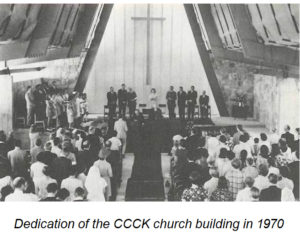 Christy sensed the Lord guiding him to devote his full-time energies to pastoring, and in late 1952, he and other teachers planted the Community Christian Church of Kabul (CCCK) for the foreign community. Christy was formally chosen as their first pastor, and they initially met in the Wilsons’ home before a building could be constructed many years later.
Christy sensed the Lord guiding him to devote his full-time energies to pastoring, and in late 1952, he and other teachers planted the Community Christian Church of Kabul (CCCK) for the foreign community. Christy was formally chosen as their first pastor, and they initially met in the Wilsons’ home before a building could be constructed many years later.
Christy and the people of CCCK ministered to ambassadors and their families, to hippies traveling through Kabul, and to many students. One day, after several hippies had become Christ followers, a very diverse group of believers lined the edge of a nearby lake, standing in wonderment, many crying softly, and all sensing a powerful unity of God’s Spirit. Suddenly one of the CCCK members broke the silence, noting to the person standing next to him, “Do you realize that this is the first public baptism to have been held in Afghanistan for over one thousand years?”
On another occasion, after a traveling musical group had completed a triumphant tour in Afghanistan, Christy drove the young musicians to an unconventional tour site: the only cemetery in Afghanistan where “infidels” could be buried. Stopping at the first gravestone, one that was worn with age, Christy explained, “This man worked here thirty years translating the Bible into the Afghan language. Not a single convert. And in this grave next to him lies the man who replaced him, along with his children who died here.” Strolling among the gravestones, Christy told story after story about the early Christian workers in Afghanistan. The group leader later recalled, “It was one of the great moments of my life. I watched their faces as it suddenly dawned on these exuberant American teenagers that the amazing spiritual awakening they had witnessed was but the last step in a long line of faithful service stretching back over many decades.”
A Church Building Destroyed, a Government Overthrown
Finally, after Christy had been ministering in Afghanistan for eighteen years, CCCK was permitted to build the only Christian church building on neutral soil in Afghanistan, constructed following a personal assist from President Eisenhower. The Afghan government permitted this place of worship only for use among the foreign community; it was never to be used by the Afghan people.
One Sunday morning, only three years after the sanctuary’s dedication, soldiers arrived and began to hack away at the wall between the street and the church building.
One gentleman in the congregation went to Kabul’s mayor and prophetically warned, “If your government touches that house of God, God will overthrow your government!” The mayor responded by ordering the congregation to turn over its church building for destruction, thereby eliminating the need for the Afghan government to pay compensation.
“This building does not belong to us but to God,” the people of the church replied. “We can’t turn it over for destruction.” And they proceeded to serve tea and cookies to the soldiers who were destroying their place of worship.
Rumors had reached the Afghan secret police that an “underground church” existed in Afghanistan. So while the workers demolished the church, they carefully dug twelve feet below its foundation in search of this secret subsurface sanctuary—but to no avail.
Before long, Christy Wilson was declared persona non grata by the Afghan government. Students were becoming followers of Christ, and certain Afghan officials were determined to rid themselves of the corrupting influence who was behind all of this. Eventually, on March 24, 1973, Christy and Betty departed Afghanistan, each carrying only a suitcase of personal belongings. They were leaving the land in which they had lived and ministered for twenty-two years. As they made their way to the airplane, Christy shook the dust from his feet.
Just four months later, on Tuesday, July 17, 1973, the Afghan soldiers completed their destruction of the church building. That very night, King Mohammed Zahir Shah, who had ruled for forty years, was overthrown in a coup, and the 227-year-old monarchy in Afghanistan came to an end forever. When Christy heard the news, he fell to the floor and wept.
Professor of World Evangelization at Gordon-Conwell
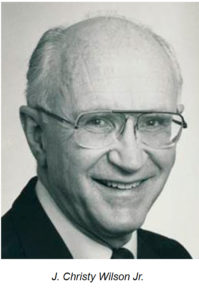 Christy spent the following two decades serving as a professor and mentor to hundreds of students at Gordon- Conwell Theological Seminary in South Hamilton, Massachusetts. When he began his professorship in September 1974, he insisted on being known as a visiting professor, holding on to the hope that he would one day return to his beloved Afghanistan. He also insisted that his title be “professor of world evangelization” rather than “professor of missions,” feeling that this more clearly described his passion and his desired role at the seminary.
Christy spent the following two decades serving as a professor and mentor to hundreds of students at Gordon- Conwell Theological Seminary in South Hamilton, Massachusetts. When he began his professorship in September 1974, he insisted on being known as a visiting professor, holding on to the hope that he would one day return to his beloved Afghanistan. He also insisted that his title be “professor of world evangelization” rather than “professor of missions,” feeling that this more clearly described his passion and his desired role at the seminary.
Every fall, Gordon-Conwell published a community directory with photos and personal information about each student, professor, and staff member. This was commonly referred to as the Facebook (long before this term was used for another purpose). Christy prayed through the entire Facebook each week, praying for each person individually. When students encountered him on campus for the first time, they would be surprised to hear a professor they had never met address them by name. When Christy and Betty traveled, his Facebook went with them. Christy would drive, Betty would read the names to him, and Christy would pray. He also established a prayer room on campus; every noon, he and a band of students united in prayer for the peoples and nations of the world.
On an Overseas Missions Practicum trip to Pakistan to minister among Afghan refugees, Christy and the team of students arrived at the airport with a large solar oven they intended to give to the displaced people. An airline employee said the transport would require an additional fee of several hundred dollars.
“Well, let me pray about that,” Christy said to the clerk. “Lord, You know this situation, and You know that the Afghan refugees need this solar oven.” Right there at the counter, Christy continued to pray, asking the Lord to work in this situation and to provide a resolution. When he had finished praying, the clerk was either so impressed or so shaken that he waived the fee.
Christy’s passion for prayer occasionally inspired good-natured jokes. During one of Christy’s classes, a student fell asleep. The student next to him poked him and said, “Dr. Wilson just asked you to pray!” The sleeping student quickly woke up, stood, and began to pray in front of the entire class. When he was finished with his impromptu prayer, Christy graciously responded, “Well, thank you, brother, for those words of encouragement.”
Mentor in Personal Evangelism and Discipleship
Christy launched a new seminary course in personal evangelism. Its inspiration came in 1969 when he participated in the North American Congress on Evangelism in Minneapolis, where evangelist D. James Kennedy was leading a seminar. Of more than six hundred pastors who attended Kennedy’s session, Christy was astonished to learn that only three, or less than 1 percent, had been taught in seminary how to lead a person to Christ. In fact, looking back on his own education, he quickly realized that he had never been taught how to share the gospel by any of his teachers; he had learned from a Christian layperson who was in the tool business.
 At that moment, Christy determined that if he ever taught in a seminary, he would teach a class in personal evangelism. Although Personal Evangelism was launched as an elective at Gordon-Conwell, hundreds of students enrolled in the course. One, a fifty-year-old pastor who had graduated from an evangelical seminary and pastored for a number of years, had never been taught how to lead a person to Christ, nor had he ever done so. As a result of the training and assignments in class, he brought the gospel to his congregation, and he was overjoyed to lead his first five people to the Lord.
At that moment, Christy determined that if he ever taught in a seminary, he would teach a class in personal evangelism. Although Personal Evangelism was launched as an elective at Gordon-Conwell, hundreds of students enrolled in the course. One, a fifty-year-old pastor who had graduated from an evangelical seminary and pastored for a number of years, had never been taught how to lead a person to Christ, nor had he ever done so. As a result of the training and assignments in class, he brought the gospel to his congregation, and he was overjoyed to lead his first five people to the Lord.
One day, as Christy’s students entered Lecture Hall 2 in the Goddard Library, they encountered a huge floral arrangement of red roses in the shape of a cross. The students gaped at this extravagant display. Christy made no comment until, finally, several of them queried him, “What’s this all about?”
Somewhat reluctantly, he admitted that each semester he too made a commitment to share Christ with ten people on Boston’s North Shore. He had gone into a local florist’s shop the day before to purchase flowers. While there, he led the proprietor to Christ. The florist brought the arrangement to campus, found out where Professor Wilson would be lecturing on evangelism, and placed the roses in front of the lectern in gratitude to the one who had shown him how to give his heart to Christ.
Christy’s former students’ remembrances of him are remarkably consistent: he would pray with you anytime and anyplace; he knew your name long before you knew his; he loved to tell stories of what God is doing throughout the world; he had a contagious smile and an infectious laugh; and he gave you a picture of what it looks like to be a lover of Christ.
Exchanging His Life for That Which Endures
There are many things for which a person can exchange his or her life. Some will endure and others will not. A list of those things that will not endure is quite long: riches, fame, strength, knowledge, possessions, power, status, our physical bodies, kingdoms, nations, the heavens, the earth. However, that which endures forever is a short list indeed: God, God’s word, human souls, and love (Ps. 90:2; 1 Pet. 1:23–25; 1 John 5:11–13; 1 Cor. 13:8).
Christy Wilson invested his life in the latter. He left a lasting legacy, and the ripple effect of his life continues to spread to people, ethnic groups, and nations throughout the world. His life continues to grow God’s kingdom and to reveal the splendor of the God he loved so much and served so well.

Ken Wilson
Medical DoctorKen Wilson, graduated as a medical doctor from the University of Texas system, followed by an Orthopedic Residency and Hand Fellowship. He then taught as a full-time academic professor at Oregon’s medical school for many years. While maintaining his hand surgery practice, Dr. Wilson decided to pursue theology. He graduated magna cum laude from Faith Lutheran Seminary with a M.Div. degree, then magna cum laude from Golden Gate Baptist Theological Seminary with a Th.M. degree. Dr. Wilson attended the University of Oxford in the United Kingdom where he received his doctorate in theology with the thesis, “Augustine’s Conversion from Traditional Free Choice to ‘Non-free Free Will’: A Comprehensive Methodology.”

Recommended Reading:
Ken Wilson, Where No One Has Heard: The Life of J. Christy Wilson, Jr. (William Carey Library Publishers, 2015)
“J. Christy Wilson will go down in history as one of the great and courageous missionaries for the gospel in the twentieth century.” (Billy Graham) Who was J. Christy Wilson Jr.? Many have never heard his name, but Christy Wilson’s life had a ripple effect in modern missions. Read the first full biography of the humble, adventurous man of prayer who helped launch the Urbana missions conference, pioneered ministry in Afghanistan when others thought it impossible, mobilized hundreds of students toward world evangelization, and reintroduced the biblical idea of leveraging one’s profession for the kingdom with the term “tentmaking.” Riveting, uplifting, and frequently amusing, this book will challenge you to reconsider what is possible when we dare to yield to Christ and His purposes in the world.
Recommended Reading:
J. Christy Wilson, Jr., More to be Desired than Gold: A Collection of True Stories as Told by J. Christy Wilson, Jr., compiled by Ivan S. Chow, edited by Helen S. Mooradkanian (Gordon-Conwell Theological Seminary, fourth edition, 1998)
This easy-to-read, powerful book contains more than 100 stories as told by Dr. J. Christy Wilson to his classes. More to be Desired than Gold demonstrates what life is like as a missionary. Reading a story or two from this book each day will enrich and inspire your quiet time!
 COPYRIGHT: This publication is published by C.S. Lewis Institute; 8001 Braddock Road, Suite 301; Springfield, VA 22151. Portions of the publication may be reproduced for noncommercial, local church or ministry use without prior permission. Electronic copies of the PDF files may be duplicated and transmitted via e-mail for personal and church use. Articles may not be modified without prior written permission of the Institute. For questions, contact the Institute: 703.914.5602 or email us.
COPYRIGHT: This publication is published by C.S. Lewis Institute; 8001 Braddock Road, Suite 301; Springfield, VA 22151. Portions of the publication may be reproduced for noncommercial, local church or ministry use without prior permission. Electronic copies of the PDF files may be duplicated and transmitted via e-mail for personal and church use. Articles may not be modified without prior written permission of the Institute. For questions, contact the Institute: 703.914.5602 or email us.
-
Recent Podcasts
The Road Back – Trevor Lancon’s Story
by Trevor Lancon, Jana Harmon on November 15, 2024Deeply involved in his church’s youth group, Trevor...Read More
-
From Politics to Pampers
by Michelle Morgan Knott, Aimee Riegert on November 15, 2024
-
An Unexpected Change – David Westerhoff’s Story
by David Westerhoff on November 8, 2024
-
Recent Publications
Will You Be Ready?
by Thomas A. Tarrants on October 23, 2024Tom Tarrants gives insights on how we can...Read More
-
Should Christians Be Involved with Politics?
by Kerry A. Knott on October 1, 2024
-
Isn ’t Atheism Based on Scientific Fact Whereas Christianity is Based on “Faith”?
by Cameron McAllister on September 1, 2024
0
All Booked
0.00
All Booked
0.00
All Booked
23169
ADVENT CALENDAR: The Amazing Prophecies Fulfilled by the Birth of Jesus Christ
https://www.cslewisinstitute.org/?event=advent-calendar-the-amazing-prophecies-fulfilled-by-the-birth-of-jesus-christ&event_date=2024-11-28®=1
https://www.paypal.com/cgi-bin/webscr
2024-11-28

Next coming event
Days
Hours
Minutes
Seconds
ADVENT CALENDAR: The Amazing Prophecies Fulfilled by the Birth of Jesus Christ
On November 28, 2024 at 6:00 amSpeakers
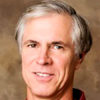
Ken Wilson
Medical Doctor
Team Members

Ken Wilson
Medical DoctorKen Wilson, graduated as a medical doctor from the University of Texas system, followed by an Orthopedic Residency and Hand Fellowship. He then taught as a full-time academic professor at Oregon’s medical school for many years. While maintaining his hand surgery practice, Dr. Wilson decided to pursue theology. He graduated magna cum laude from Faith Lutheran Seminary with a M.Div. degree, then magna cum laude from Golden Gate Baptist Theological Seminary with a Th.M. degree. Dr. Wilson attended the University of Oxford in the United Kingdom where he received his doctorate in theology with the thesis, “Augustine’s Conversion from Traditional Free Choice to ‘Non-free Free Will’: A Comprehensive Methodology.”



